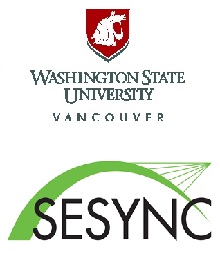ABSTRACTThis module uses a “linked-classes” approach to teaching socio-environmental synthesis. A three-week (6 class) module is taught in two different classes (one in biology, one in policy studies). Students conceptualize and conduct research around a common focal question from specific stakeholder/expert positions. Our focal question was: “Should the Federal Energy Regulatory Commission relicense the hydroelectric dams on the Cowlitz River? If so, should the dams be modified?” Using a two-step “jigsaw” approach, students first meet in their expert group, then are mixed with students from both classes and all expert groups together in a joint conference to address the original focal question. Students submit final written assignments demonstrating their contribution of expert/stakeholder knowledge and reflecting on the synthetic interaction in the conference. AUTHORSGretchen Rollwagen-Bollens1, 3 and Paul Thiers2 1School of the Environment and School of Biological Sciences, Washington State University Vancouver, 14204 NE Salmon Creek Ave, Vancouver, WA 98686 2School of Politics, Philosophy and Public Affairs, Washington State University Vancouver, 14204 NE Salmon Creek Ave, Vancouver, WA 98686 3Corresponding author: Gretchen Rollwagen-Bollens rollboll@wsu.edu) CLASS TIMEThree-week module, approximately 8 hours of class time OUTSIDE OF CLASS TIMEStudents conduct literature and internet research to find data sources, and write a conference report; 6-12 hours, varies with student capacity. STUDENT PRODUCTS
SETTINGClassroom. No special resources or infrastructure needed. COURSE CONTEXTBiology (Bio) 106 is the first course in a two-semester sequence required of all BS Biology and BS Environmental Science students at Washington State University Vancouver. This course is aimed toward freshmen new to the major and to the university, but there are also a substantial number of upper classmen who have decided to switch majors or are fulfilling the requirements for health-related professional programs. As a required course for Bio and ES majors, and a pre-requisite for many upper-division courses, the syllabus is somewhat constrained. But there is some flexibility to organize the course, so long as it aligns to the learning goals and outcomes established by the School of Biological Sciences. Political Science (PolS) 430 is an elective designed for upper division (and some graduate) students with a background or interest in public policy. There is flexibility in defining the goals of the course and the design of the syllabus. The role of environmental science in environmental policy and politics has traditionally been just one of many factors considered in the course. Students are not required to have an environmental science background. INSTITUTIONWashington State University Vancouver (WSUV) is one of 5 campuses in the WSU system, a land-grant R1 university. The student demographic at WSUV is dominated by older (mean age ~30 years), female (~60% of students), place-bound individuals, who are often the first in their families to attend college, have at least part-time but more often full-time employment while attending college, and often have families. PolS 430 students tend to meet this non-traditional profile. About half of the students are Public Affairs majors (preparing for careers in governance) and half come from a variety of majors including some undergraduate and graduate students in Environmental Science. The Bio 106 course tends to have a slightly higher proportion of “traditional” freshmen (i.e. in early 20’s, single, recent high school graduate) since most of the students who enroll at WSUV right out of high school are seeking a Biology degree. However, enrollment in both classes is usually reflective of the WSUV student demographic. TRANSFERABILITYThe linked classroom approach brings together students from different disciplines working on different class contents to work together on a socio-environmental synthesis project. This module could be used by any two instructors teaching two different courses, one in biology or environmental science and the other in policy studies, political science or environmental sociology. DOWNLOADSDescription of other Resource Files:
ACKNOWLEDGMENTSThis project was part of a multi-institutional teaching study supported by the NSF Socio-Environmental Synthesis Center to assess the effectiveness of teaching socio-environmental synthesis (SES) using different pedagogical approaches in a variety of undergraduate institutional settings. We thank all of our colleagues from the participating institutions (University of Maryland College Park, Coppin State University, Gallaudet University, Widener University) and Alan Berkowitz of the Cary Institute of Ecosystem Studies. This work benefited from support from the National Socio-Environmental Synthesis Center (SESYNC) NSF award DBI-1052875. CITATIONGretchen Rollwagen-Bollens and Paul Thiers. 10 April 2017, posting date. Socio-environmental Synthesis: Linking Biology and Political Science Courses to Assess Hydroelectric Dam Relicensing Teaching Issues and Experiments in Ecology, Vol. 12: Practice #4 [online]. https://tiee.esa.org/vol/v12/issues/rollwagen-bollens/abstract.html |

|
<top> | |